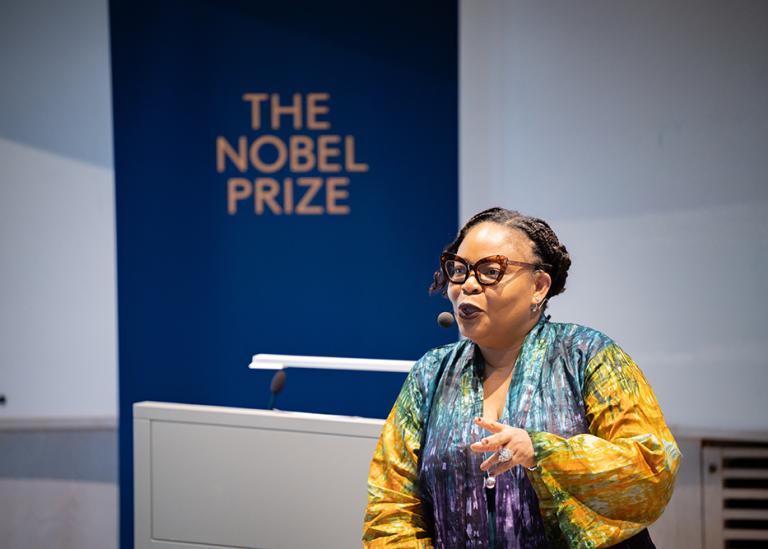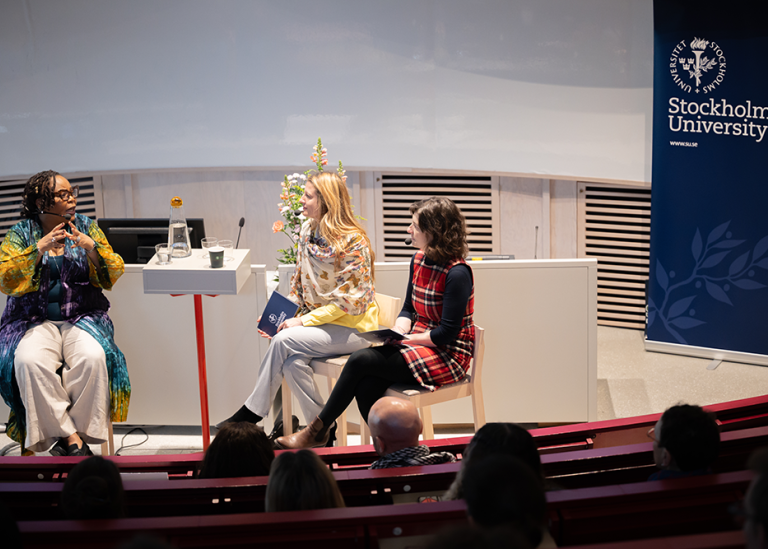Nobel Peace Prize Laureate Leymah Gbowee: knowledge and compassion together can make a difference

This historic achievement paved the way for the election of Africa's first female head of state, President Ellen Johnson Sirleaf. It also marked a new wave of women emerging around the world as key players in brokering lasting peace and security.
Leymah Gbowee is also the founder and president of the Gbowee Peace Foundation Africa, a board member of the Nobel Women's Initiative and of several other international organisations.
Lecture for SU students
At the end of March, Leymah Gbowee visited Stockholm University to give a lecture on the role of education as a tool for peace and justice and to answer questions from students. She began by painting a bleak picture of the world today. There are ongoing wars in 70 countries and there are more than 290 separatist groups in Africa.
She highlighted the paradox that there is more wealth in the world than ever before, but at the same time there is poverty and misery combined with the large number of ongoing wars. Education has an important role to play in understanding and changing the world.
We should not confuse education with schooling. A real education is not just what you learn in school or at a university. It also includes things like understanding people, cultures and ethical issues, said the Nobel Prize laureate.
Bringing an end to civil war in Liberia
Liberia declared independence from the United States in 1848. But it was not until the 1950s that Liberian women were given the right to vote in elections. However, Liberian women were still bound by social and cultural conventions and were unable to participate fully in political life. With civil war raging for over a decade, Leymah Gbowee set out to end the war and empower women.
“If you live in a country, you have to be part of the political process,” she said, and her way of doing this was to start the non-violent movement that brought together Christian and Muslim women and ended Liberia's civil war in 2003.
Liberia has now been at peace for 22 years. But there is still much to be done, Leymah Gbowee says:
Peace is not the absence of war. It is the full expression of human dignity. Peace means food on the table in every home, education for our children, health systems that function, and a fair and unbiased justice system, among other things”.
But the ones making a difference are the individuals, as she has underlined:
You will be remembered for the content of your character and what you do to make the world a better place. If there are people who act on this in all the countries where there are ongoing wars, there will be an impact”, said Leymah Gbowee durign her lecture.
Success for women's movements
When asked about the idea of starting a separatist women's movement for peace , Leymah Gbowee described it a successful strategy. The women's movement in Liberia changed the narrative “that politics was only for boys with guns” – and led to the end of the civil war. “People underestimate the power a few women without guns can have”, she concluded.

The session was closed with a question about how we can increase gender equality by changing the narrative from "battle of the sexes" to one where empowering women improves the lives of everyone.
There is no 'versus', it is a collaborative thing. As you have to see the whole picture and that is difficult if you have one eye closed. We need the views of both women and men to move forward", Gbowee concluded.
Latest Highlights:
One million euros for AI research project involving the University of Bucharest
Common people of Troy drank wine, researchers prove for the first time
SU researchers keep monitoring glaciers as UN puts a spotlight on the need to preserve them
UNIL PhD students benefit from short-term research mobilities within CIVIS
